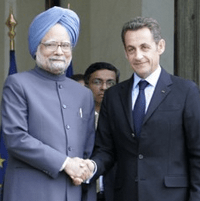French President Nicolas Sarkozy is the latest head of state to visit India at a time when the latter is looking to award lucrative contracts in energy, infrastructure, security and other areas. As with U.S. President Barack Obama's visit last month, Sarkozy sought to develop positive atmospherics by making the "right noises" on issues New Delhi holds dear, such as permanent membership on the U.N. Security Council and entry into the Nuclear Suppliers Group as well as terrorism emanating from the Afghanistan-Pakistan region. The visit also saw forward movement on a number of bilateral deals valued at around $20 billion. Both sides seek a more-enduring partnership than a purely commercial transaction, however. Sarkozy seemed to indicate as much during the visit. "We did not come to visit a big client like we were big suppliers," he said. "Instead we came to visit a partner."
The industrial flagship of that partnership is civil nuclear cooperation. The visit's headline deal was a framework agreement signed between the Nuclear Power Corporation of India Limited (NPCIL) and Areva, a French nuclear-power corporation, for the supply of two 1,650-MWe European Pressurized Reactors. While unconfirmed reports pegged the value of the contract at $9.3 billion, the framework agreement is more of a guideline than a final settlement. A conclusive deal remains some distance away as the two sides hash out issues over India's recently passed nuclear-liability law, which brings suppliers within its ambit.
Nevertheless, France and India may find each other increasingly indispensable in the nuclear sphere. The 2008 Indo-French nuclear agreement specifically enjoins France to assist uranium-hungry India in building up a strategic stockpile of the metal to safeguard India's nuclear-power generation in the event of a supply disruption. For its part, Areva has identified a number of Indian players for nuclear-component manufacturing, which may prove crucial to the company's cost-competitiveness as the global nuclear renaissance gathers pace and Korean and Chinese suppliers enter the market.

